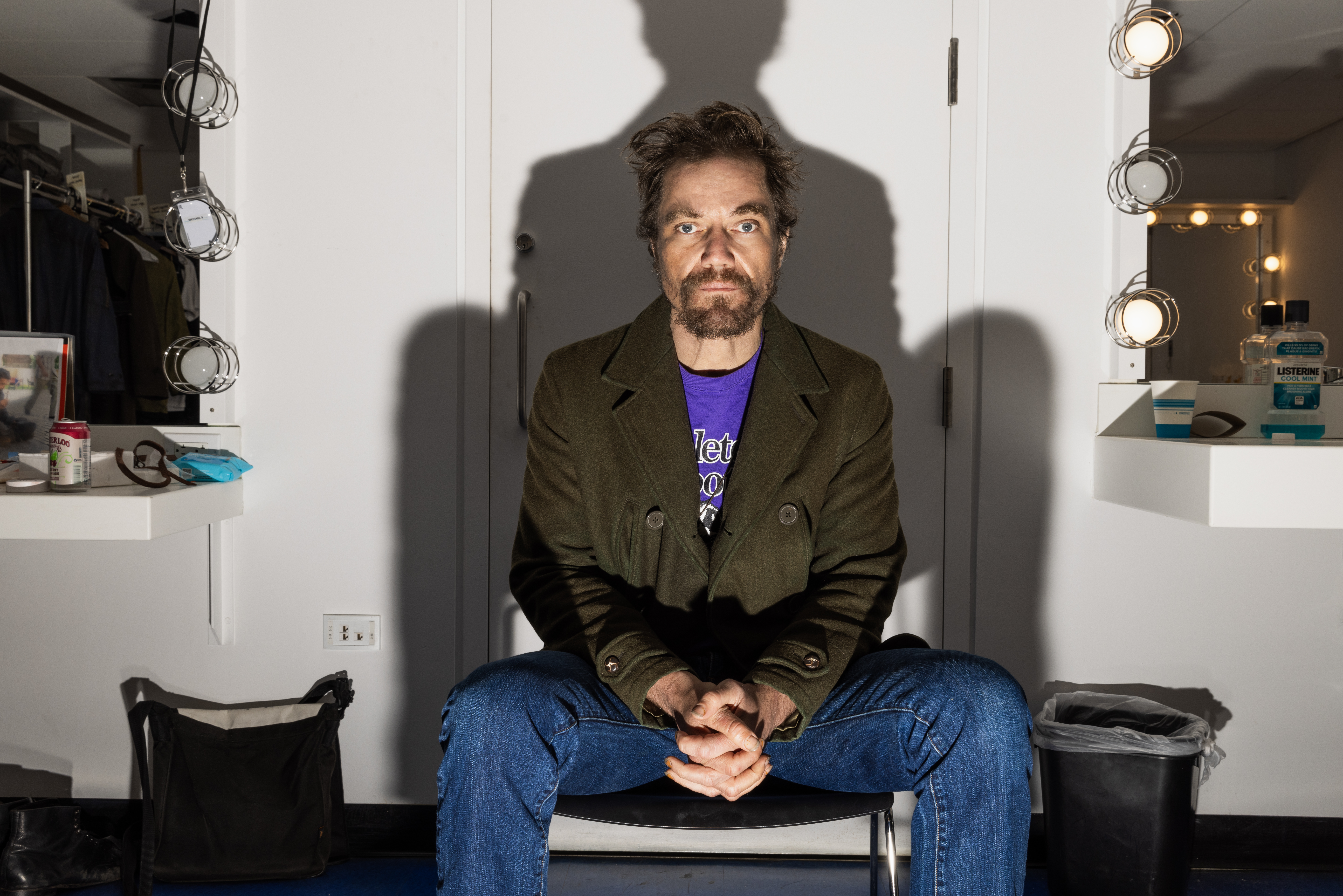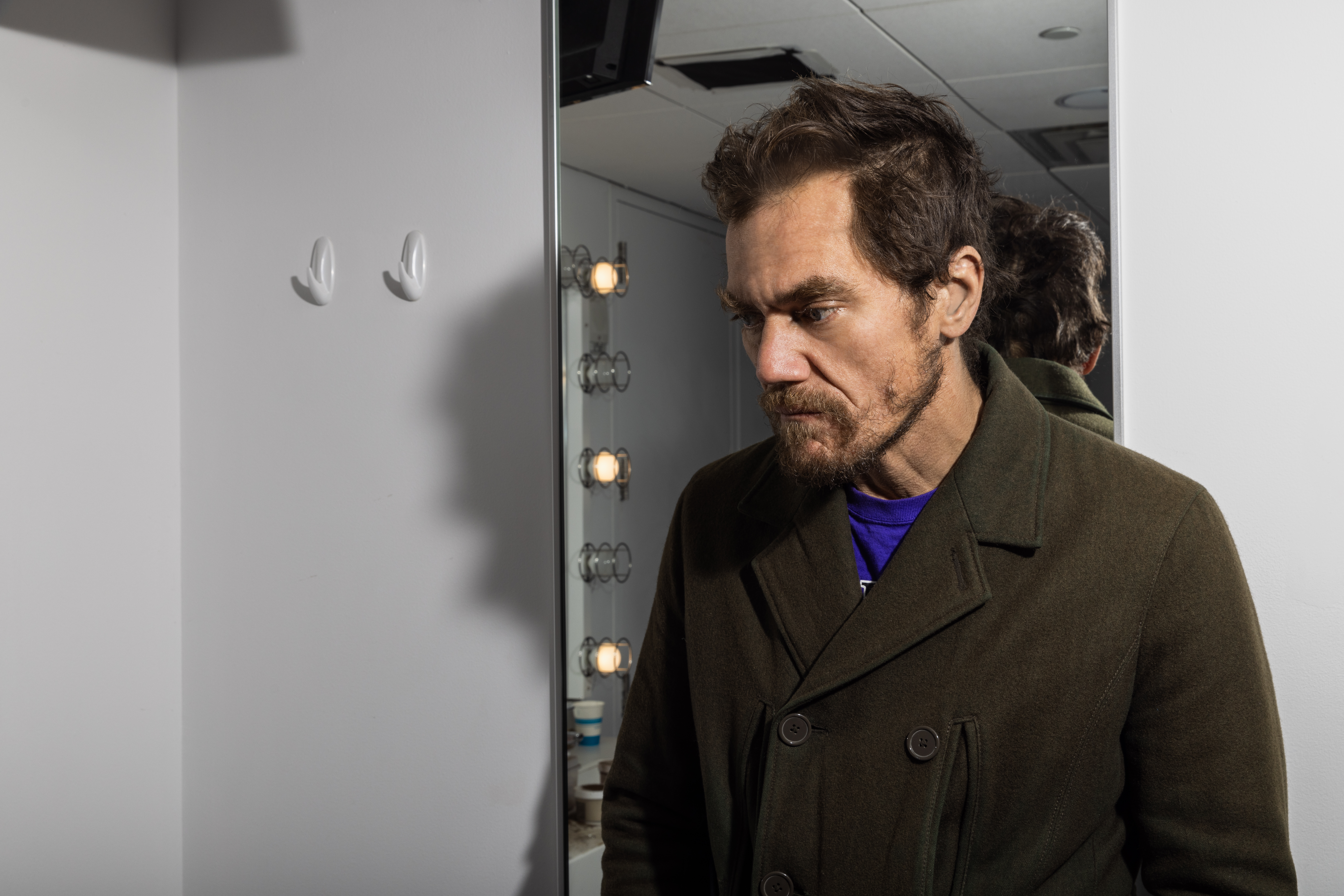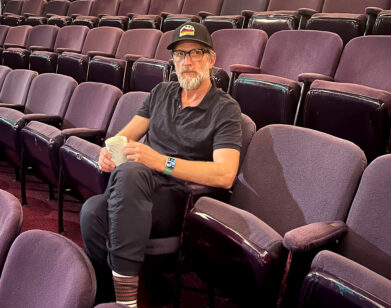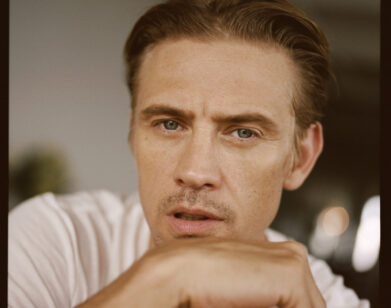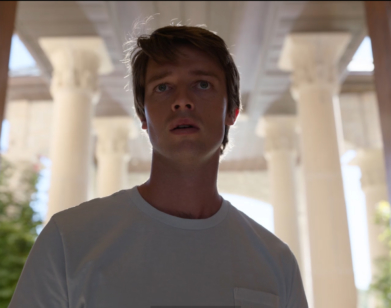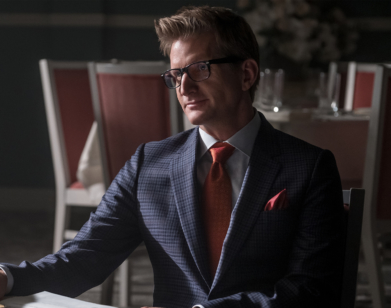BACKSTAGE
For Michael Shannon, Waiting for Godot Is the Ultimate Opportunity
Earlier this year, when I interviewed the actor Paul Sparks, who was then playing Henry in The Grey House, he revealed to me, a bit sooner than his publicists would have liked, that his next project was a production of Waiting for Godot at the Theater for a New Audience. The only actor, Sparks said, with whom he could imagine tackling the dense, despairing, and singularly precise words of Samuel Beckett was his good friend Michael Shannon. So, last week, nearly a decade after Sparks and Shannon starred in the theater’s 2014 staging of Eugène Ionesco’s The Killer, they began their run as Vladimir and Estragon, respectively, appearing here as a pair of wretched jesters in bowler hats. Director Arin Arbus has conceived of Beckett’s “country road” as a jet-black runway, making especially pronounced the characters’ experience of life as a punishing, empty void (“Let’s hang ourselves immediately,” Estragon suggests). But the actors, demonstrating an easy physical chemistry, fill it admirably, as Shannon synchronizes his brooding Gogo with Sparks’s Chaplinesque interpretation of Didi.
“It’s a monumental undertaking,” Shannon said the day after their opening show from a backroom of the theater. “Estragon is a state of mind that exists in all of us,” he continued, “or can exist in us if we’re overcome by it.” Shannon seemed, if not overcome by the play, at least deeply occupied by its notions of humanity. And while Beckett’s text commands a great deal of discipline and fidelity, he and Sparks were still plumbing its depths, finding new questions to ponder and play with. “The play,” he explained, “is an opportunity to go somewhere that doesn’t exist unless we’re doing it.”
———
MICHAEL SHANNON: Hi.
JAKE NEVINS: How’s it going?
SHANNON: Oh, you know.
NEVINS: I had the pleasure of seeing the show last night. Congratulations on such a fresh production of something that’s hard to make fresh.
SHANNON: Oh, yeah? Have you seen it before?
NEVINS: Only a high school production, and not with actors as formidable as you and Paul.
SHANNON: Thanks.
NEVINS: I’m curious what your prior encounters were with Waiting for Godot and Beckett’s work in general.
SHANNON: Well, I first saw Waiting for Godot when I was a kid. I think I was 11 or 12 and I saw it in a production that was outdoors, outside of a school actually, where the playground was, and it made a huge impression on me. I think it is probably one of the things that’s responsible for me getting into the theater in the first place. And I’ve seen Happy Days with Fiona Shaw at BAM [The Brooklyn Academy of Music], which I really loved. And I saw a production of Endgame at Steppenwolf, which I really loved. I’ve done a lot of Ionesco over the years and he’s kind of my favorite playwright, but I had never actually done a Beckett play myself. The way it came to be was kind of random, really. I was just sitting and talking with Jeffrey Horowitz, who runs the theater, and we were brainstorming about possible productions to put together and it just popped into my head, the idea of doing it with Paul, specifically.
NEVINS: I imagine the language, specifically all that philosophical slapstick, might be quite daunting.
SHANNON: Well, it’s a monumental undertaking. It’s not something that you can just follow simple instructions for. But, like most great plays, it really draws you back to your own life and your own situation. It’s very universal, I think. I think if you are willing to look at it and willing to be patient with it, it can reveal a lot to you about how you navigate your own life and navigate the world. And, frankly, I’ve just felt a lot of kinship with Estragon in terms of some of my own trials and tribulations of late. So it’s almost like you’re not really creating a person that’s separate from you. Estragon is a state of mind that exists in all of us, or can exist in us if we’re overcome by it. It’s different from other plays in that regard.
NEVINS: I appreciate that distinction and the way you both approached the characters. Paul, of course, plays Vladimir with a sort of playfulness, highly gestural and expressive. What’s it like to play opposite Vladimir as Paul has conceived of him?
SHANNON: Well, Paul is always giving so much of himself. He’s such a generous performer and he’s so playful and creative and intelligent in his work and it’s thrilling to fill the space that he creates. A lot of times I refer to it as a negative, like I’m the space around the light that he’s inhabiting and creating, like I’m the darkness. We both feel like there’s still so much to learn as we do the show. We don’t feel like we’ve figured it out or that we’re done and we can just do what we made up in rehearsal. We don’t want to just repeat something night after night. Now, it’s also a very deceptively precise show, so there is some discipline involved in terms of the rhythm of it. The music of it is very precise, but within those parameters, I feel like we both are still searching pretty fervently.
NEVINS: Well, to that end, what has revealed itself in the text through the rehearsal process?
SHANNON: Well, I feel like the thing that’s most elusive about the play. When you’re in rehearsal, you get fixated on certain portions of the text or certain sections, and sometimes you don’t see the forest for the trees. But when you’re performing, you start to get a better sense of what the overall journey is, and the audience is helpful with that too, because we learn a lot from how people watch. You can feel it in the room when you get lost, or when things aren’t necessarily clicking and you’re like, “Oh, I took a wrong turn somewhere.” That’s really what I’m focused on right now, and I can’t say that I’ve come up with any answers. The play defies you to do that. But there’s different permutations and versions of things, and some nights you get surprised by feelings that come to the surface that you hadn’t had before.
NEVINS: Like what?
SHANNON: You have to be very open when you do this play. You can’t go out with expectations and it reveals itself in different ways as long as you’re open to it. There’s a lot of pain in this play. And it’s surprising, a lot of the play can be considered nonsensical or silly or funny or whatever, but Beckett was writing from a place of profound pain, pain so profound that it’s not something you can put into words other than the words that he chose, which is what makes him an artist of the stature he is.
NEVINS: Right. He wrote it only several years after joining the French resistance in World War II.
SHANNON: I was talking to my friend this morning about the play and he was talking a lot about the war, the war effort, how the war influenced this play and Beckett’s experiences as a medic. So some things in the play are very silly. You have four men laying on the ground who say they can’t get up. But my friend said that’s a reference to what he would see when he was on the battlefield. And it’s his ability to turn those experiences into absurdity that makes him so unique.
NEVINS: It’s interesting how he thought of absurdity and humor in the play, particularly in live productions of it. Could I read you a note he wrote to a director who wanted to stage Godot in the 1950s?
SHANNON: Please.
NEVINS: He says, “The farce side seems indispensable to me as much from the technical point of view (comic relief) as for reasons to do with the spirit of the play. Therefore, it’s neither to be hurried nor overdone. Laugh at them then and get them laughed at, but not all the time, and always a little reluctantly.” So, I’m curious, as an actor, how you attune the play’s sense of humor accordingly.
SHANNON: I hear what you’re saying. Well, something I’ve heard said from time to time is that tragedy and comedy aren’t two ends of a spectrum. For me, they’re more circular. Things are funny or tragic in relation to your point of view on them. And it’s not like anything can strike a chord in any particular way depending on how you’re looking at it. I think the humor in the play is not just necessary to keep the audience from being completely alienated. I also think it’s a matter of survival. Humor is a matter of survival. It’s a matter of surviving the landscape, the terrain that these people are in. Perhaps the strongest part of the connection between Vladimir and Estragon is that they entertain each other. That’s the substance of their friendship, that they’re able to keep each other occupied. And I think Estragon thinks that Vladimir is funny and that is something he desperately needs in order for him to keep on keeping on, as they say.
NEVINS: That’s interesting, because humor in the play serves that very same function for the audience, somewhat alleviating their sense of entrapment. Their kinship with one another makes you want to stick with something that might otherwise feel kind of punishing.
SHANNON: We really don’t intend to bum anybody out. I guess I’ve heard people talk about productions of this play that were, I don’t know, a little less buoyant than ours, I suppose. I think I even read a review that said they get the humor part, but they didn’t get the dark stuff right, or something.
NEVINS: A review of this production?
SHANNON: Of this production, yeah. I don’t know how to make dark stuff dark. It’s already dark.
NEVINS: Right.
SHANNON: The play is an opportunity. It’s an opportunity to go somewhere that doesn’t exist unless we’re doing it. And we want to welcome people into it. We don’t want to alienate people. We want people to hear it. We want people to hear the play because there’s nothing that’s in the room that’s going on that is as important as the actual play. The play is the star, and we’re just trying to deliver it in a way where you can hear it and feel it. We don’t want to put up walls, or make it seem inaccessible. The way it’s directed and designed is all about trying to make it feel intimate and trying to make it feel like you’re involved as an audience member. It’s not a proscenium. You’re not all sitting in the dark.
NEVINS: To your point, I quite liked the staging of it. The runway you two are on has a sprawl to it, as if that road could go on and on. But it doesn’t come at the cost of intimacy.
SHANNON: Thank you.
NEVINS: Are there other plays, canonical or otherwise, that you’re jonesing to do?
SHANNON: Not at this moment. Kind of like how I said earlier, this just kind of popped into my head. I’m pretty spontaneous about things. I don’t have a list at home of the things I want to do. Things just occur to me or present themselves to me and then I do them. But this theater is known for Shakespeare, and Jeffrey’s talked to me about doing Shakespeare, so maybe that’s on the horizon. But I wouldn’t even know which play. I get so focused on whatever it is that I’m doing that I forget about the future.
NEVINS: It shows. Congratulations. And thanks for your time.
SHANNON: My pleasure. Thank you.

